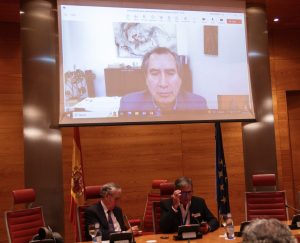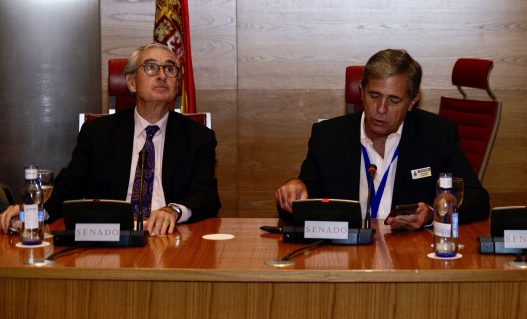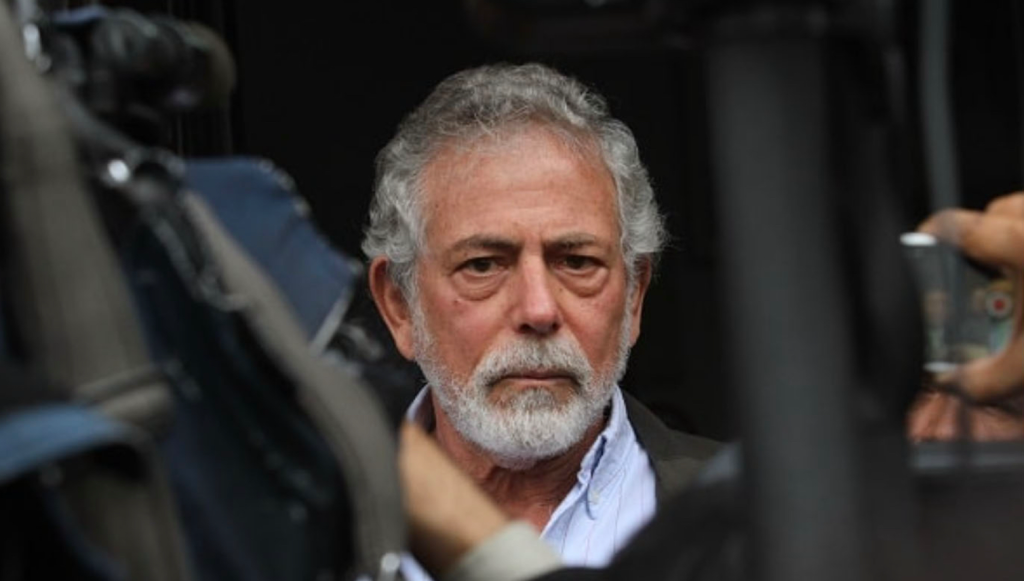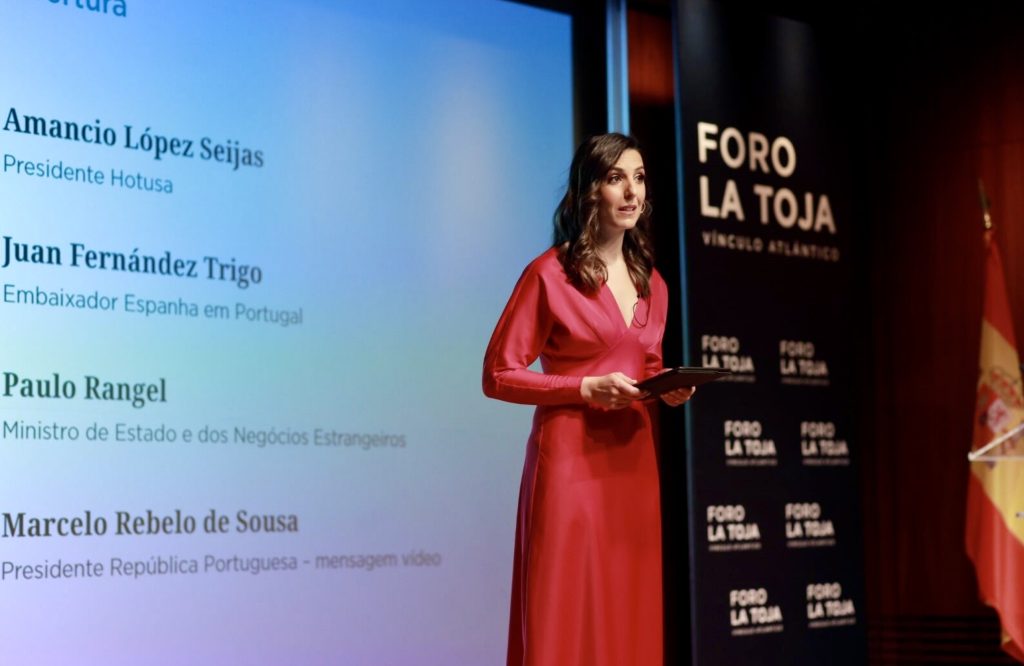
BETWEEN LEFT AND RIGHT TURNS, CAN LATIN AMERICA AND EUROPE MEET?
Latin America and Europe are trying to find each other. But how much does the political tendency of the governments of the countries in each region influence this goal, positively or negatively? Can the leftward or rightward shifts in the nations be an obstacle to the achievement of common projects and positions?
To answer these questions, the VII Congress of Media Editors of the European Union, Latin America and the Caribbean, EditoRed, invited two experts: Adriana Bonilla, executive director of the EU-LAC Foundation, and Ramón Jáuregui, director of the Euroamerica Foundation.
They participated in the panel “Where are Latin America and Europe turning politically?”, which was moderated by Carlos Roberts, Deputy Secretary General of Redación, La Nación newspaper of Argentina.
The meeting took place on March 19, at the premises of the Spanish Senate in Madrid. A summary of the event can be seen in this video from Canal Europa.
WHERE IS LATIN AMERICA HEADING?
In Latin America and the Caribbean, in principle, there are 12 countries governed by left or center-left politicians. In principle, those of the right or center-right are in charge of eight countries.
Yes, “in principle”, because, according to Adriana Bonilla, in reality, the agendas of each country, even those with governments of the same tendency, are not the same. Basically, there is not a left-wing and a right-wing project that are disputing in the region.
Bonilla assured that, for example, Chile’s economic agenda is not the same as Brazil’s, nor does Venezuela’s converge with Mexico’s or Colombia’s, despite the fact that they all have left-wing governments. The same happens with those on the right: Argentina does not have the same project as Uruguay, El Salvador or Panama.
“In Latin America, identification with a tendency does not imply that similar international policies will be produced”, was Bonilla’s conclusion.
And the explanation of why this happens is not in politics, in the ideological strength or weakness of the rulers, but in the economy of the countries.
In general, Bonilla explains, Latin American countries are economies that offer competing products on the world market, mostly agricultural commodities. With the exception, perhaps, of Mexico, which is more industrialized due to its ties with the neighboring United States.
The problem is that, since 2012, the region has remained in recession. The value of exports has declined. The longed-for development is not consolidating.
It can be said that in Latin America elections are won neither by the left nor the right: they are won by dissatisfaction, which is sustained by the economic crisis from which the region is unable to emerge. Bonilla notes that in the last Latin American elections (at least where they can be democratically exercised) the oppositions have generally won.
WHICH WAY DOES EUROPE TURN?
Something very different is happening in Europe. The countries governed by the liberal right or the social democratic left have managed to consolidate a common project, both politically and economically: the European Union. At least until now.
Because, as Ramón Jáuregui explained, in the European bloc there is an anti-European tendency that is growing hand in hand with nationalist parties of the far right. These parties are based on the idea that the Union is not fulfilling its mission and that each country would be better off going on its own.
There are expressions of this type in France, Italy, Poland, Hungary, the Netherlands… the United Kingdom, in fact, left the community.
The upcoming elections to the European Parliament (June 6-9), and from which the leadership of the European Commission will emerge, will show how strong this anti-European trend is.
Jáuregui predicts that the liberal, social democratic and “green” forces will give an absolute majority in the Parliament, which would allow further strengthening of the European project.
“The European Union is an extraordinary project, a supranational organization that has been in existence for 70 years with positive results,” said Jáuregui. Europe has been built, he said, on the rule of Jean Monnet. He said: “I have always thought that Europe would be formed in crises, and that it would be the sum of the solutions we bring to those crises”.
Certainly, in the face of the serious difficulties that have arisen, the Union, now made up of 27 countries, has managed to hold its own and move forward. This has been the case with recent crises such as Brexit and Covid. Now they are facing a serious one with the war between Russia and Ukraine and the complications for the provision of electric energy and for the security of the whole area that such a conflict has entailed.
All this is part of the great current challenge of the Union: strategic autonomy, which implies being less dependent in terms of defense, energy supply and food supply. Other major current issues for Europe are the green transition and digital regulation.
For all of these, it needs to continue to maintain its unique integration. And it also requires adding partners. And it has placed special interest in one of them: Latin America. The big problem is that, as we have seen, Latin American integration is still a dream.
SCOPE AND LIMITS OF CELAC
The only organization where the countries of Latin America and the Caribbean converge, for now, is CELAC. There are other sub-regional organizations, such as Mercosur, the Andean Community, Caricom. Others have lost their weight, such as Unasur or ALBA.
But although it brings together all the countries, CELAC is not a mechanism for economic integration (like the European Union) but for political dialogue, explained Adrian Bonilla. It cannot issue supranational norms (like the European Union), it can only issue declarations on issues of common interest.
In any case, as a bloc, CELAC’s main contact is with the European Union, with which it resumed presidential summits last year and even made a commitment to hold them every two years.
This relationship between two large blocs, Bonilla considered, helps to build the idea of the existence of a political community of Latin America and the Caribbean, because there is a counterpart that recognizes it. However, the main drawback is that intergration, in the end, implies having institutions that make it operational “and in Latin America this does not exist”, Bonilla pointed out.
Jáuregui acknowledged that, for example, the fact that Latin America does not have a single spokesperson, as the European Union does, makes it difficult to implement the agreements reached at the 2024 Summit. Even so, he maintained that it is imperative to advance in integration, regardless of whether or not Latin American economies are complementary to each other.
COMMON ISSUES
One way to link countries can be around common issues. At the CELAC-EU Summit it was seen that among the most important issues are the environment, the enforcement of international law, support for development and energy. Trade has been handled bilaterally, and one of the most important negotiations in this field, that of Mercosur, has not yet been closed.
There have also been disagreements that can be explained by the relations that each country has with its extra-regional partners. There are different positions in Latin America on the issues of the war between Russia and Ukraine, the war between Israel and Hamas, the situation in Palestine, the US and the emergence of China as the new major player on the world chessboard.
By the way, China is the foreign economy with the largest presence in Latin America, achieved through bilateral agreements for investment in infrastructure and trade. This presence is greater, in economic terms, than that of the European Union (although it has increased) and the US.
ABOUT THE EDITORS’ CONGRESS
The VII Congress of Media Editors of the European Union, Latin America and the Caribbean is an event organized by Grupo Prestomedia with the support of EditoRed, the European Commission and the European Parliament, Telefónica, Iberia and the Community of Madrid, as well as the collaboration of Universidad Rey Juan Carlos, Turismo de Galicia and Casa de América, and with Prensamedia as editorial partner.
This year, the general theme of the Congress was: “The quality of information and the credibility of the media, guarantees for democracy”. The meeting took place on March 18-19, 2024 in Madrid, Spain, and on March 20-21 in Brussels, Belgium.
————
This text is free to use. If you use it, please cite EditoRed.



